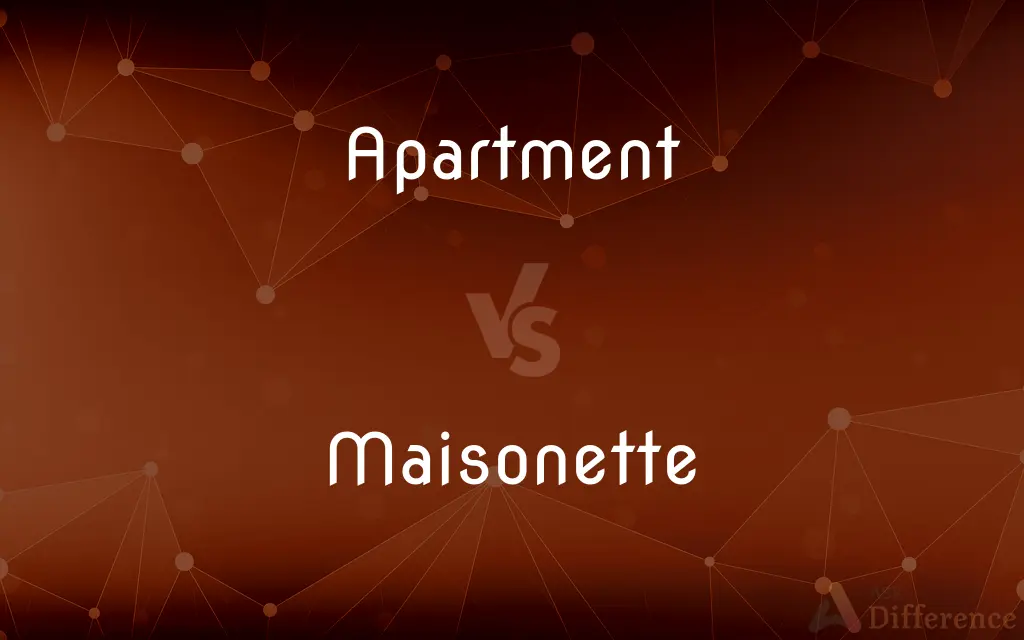Apartment vs. Maisonette — What's the Difference?
Edited by Tayyaba Rehman — By Maham Liaqat — Updated on April 27, 2024
An apartment is a self-contained housing unit within a larger building, while a maisonette is a multi-floor apartment with its own private entrance.

Difference Between Apartment and Maisonette
Table of Contents
ADVERTISEMENT
Key Differences
An apartment typically refers to a single-level residential unit that is part of a larger building with multiple similar units. These buildings often have shared amenities like laundry rooms, gyms, and common areas. Maisonettes, on the other hand, are apartments spread over two or more floors, resembling a small house within a larger building, and feature private entrances that distinguish them from typical apartments.
While apartments are usually designed on a single floor making them accessible and compact, maisonettes offer more space and the feel of a house due to their multiple floors. This often includes distinct living and sleeping areas spread across different levels.
In terms of privacy and entry, apartments generally share a main entrance and common hallways with other units. Maisonettes enhance privacy with their own separate entrances, sometimes directly from the street or through a private staircase, making them feel more like standalone homes.
From an architectural perspective, apartments can be found in both high-rise and low-rise buildings and are common in urban environments. Maisonettes are less common and can be seen as a blend of apartment living and townhouse attributes, often located in both urban and suburban settings.
Ownership and rental opportunities differ slightly between the two; apartments are predominantly rented, though ownership through arrangements like condominiums is common. Maisonettes, given their larger size and private entry, often attract long-term renters or buyers looking for something close to a house but within a multi-unit building.
ADVERTISEMENT
Comparison Chart
Floors
Typically one
Multiple
Entry
Shared building entrance
Private entrance
Space
Compact, efficient use of space
More spacious, house-like feel
Commonly Found In
Urban high-rises, multi-story buildings
Urban and suburban, often in lower-rise buildings
Privacy
Less private due to shared entrances and facilities
More private, fewer shared areas
Compare with Definitions
Apartment
Often part of a building with many similar units.
The apartment complex had over 200 units.
Maisonette
Offers more space and privacy than a typical apartment.
Their maisonette feels more like a house than an apartment.
Apartment
A self-contained unit within a larger building.
They rented an apartment in downtown.
Maisonette
Designed to mimic the feel of a house within a larger building.
The best part about their maisonette is the private rooftop terrace.
Apartment
Designed for efficiency and compact living.
The studio apartment makes excellent use of its small space.
Maisonette
Suitable for families or those seeking house-like living without full house responsibilities.
They chose a maisonette because they wanted less upkeep than a house requires.
Apartment
Common in both rental and ownership forms.
She owns three apartments in that building.
Maisonette
Often features amenities like multiple bathrooms and larger living areas.
The maisonette has three bedrooms and a spacious living room.
Apartment
An apartment (American English), or flat (British English, Indian English, South African English), is a self-contained housing unit (a type of residential real estate) that occupies only part of a building, generally on a single story. There are many names for these overall buildings, see below.
Maisonette
A multi-floor apartment with its own private entrance.
They live in a maisonette with a lovely view of the park.
Apartment
A flat, typically one that is well appointed or used for holidays
Self-catering holiday apartments
Maisonette
A set of rooms for living in, typically on two storeys of a larger building and having a separate entrance.
Apartment
A room or suite of rooms designed as a residence and generally located in a building occupied by more than one household.
Maisonette
A small house.
Apartment
An apartment building
A row of high-rise apartments.
Maisonette
An apartment occupying two or more floors of a larger building and often having its own entrance from outside.
Apartment
A room.
Maisonette
A small house
Apartment
Apartments Chiefly British A suite of rooms within a larger building set aside for a particular purpose or person.
Maisonette
An apartment often on two floors
Apartment
A complete domicile occupying only part of a building, especially one for rent; a flat.
Apartment dwellers
Maisonette
A self-contained apartment (usually on two floors) in a larger house and with its own entrance from the outside
Apartment
(archaic) A suite of rooms within a domicile, designated for a specific person or persons and including a bedroom.
Maisonette
A small house
Apartment
(obsolete) A division of an enclosure that is separate from others; a compartment
Apartment
A conceptual space used for separation in the threading architecture. Objects in one apartment cannot directly access those in another, but must use a proxy.
Apartment
A room in a building; a division in a house, separated from others by partitions.
Apartment
A set or suite of rooms.
Apartment
A compartment.
Apartment
A room or suite of rooms in a building comprising a dwelling unit separate from others in the building, and typically having its own separate bath, sanitary, and kitchen facilities. Such apartments are in most cases rented from the owner by those dwelling in them.
Apartment
A suite of rooms usually on one floor of an apartment house
Apartment
Typically on one level.
Their apartment is on the fifth floor of a high-rise.
Common Curiosities
Is it common for maisonettes to have outdoor spaces?
Yes, maisonettes often come with balconies, terraces, or small gardens, enhancing their house-like appeal.
Can apartments also have multiple floors?
While rare, some luxury apartments might have multiple floors, but these are generally not the standard.
What are the key advantages of living in a maisonette over an apartment?
Maisonettes offer more space, privacy, and the feel of a house, including multiple floors and private entrances.
Do maisonettes typically have their own parking spaces?
While not guaranteed, maisonettes often have better access to private or dedicated parking compared to standard apartments.
What kind of security features are typical in maisonettes?
Maisonettes may feature enhanced security measures like private gated entries or security systems due to their separate entrances.
Are maisonettes a good investment compared to apartments?
Maisonettes can be a good investment due to their unique features and appeal to those looking for a blend of apartment and house living, potentially attracting a specific market segment.
Are maisonettes more expensive than apartments?
Generally, due to their larger size and additional privacy, maisonettes can be more expensive than standard apartments.
How does living in a maisonette compare with living in a townhouse?
Maisonettes share similarities with townhouses, such as multiple floors and private entries, but are typically part of a larger building rather than completely detached structures.
What is the best choice for urban living between an apartment and a maisonette?
This depends on individual needs; apartments are more common and potentially more accessible in dense urban areas, while maisonettes offer more space and privacy, which can be harder to find in city centers.
How does the maintenance responsibility differ between apartments and maisonettes?
Maintenance in apartments is often handled by a building management, covering common areas and external repairs, while maisonette owners might have more responsibility for internal maintenance due to the private nature of the entry and setup.
Share Your Discovery

Previous Comparison
Glycerin vs. Glycerol
Next Comparison
Geometric vs. GeometricalAuthor Spotlight
Written by
Maham LiaqatEdited by
Tayyaba RehmanTayyaba Rehman is a distinguished writer, currently serving as a primary contributor to askdifference.com. As a researcher in semantics and etymology, Tayyaba's passion for the complexity of languages and their distinctions has found a perfect home on the platform. Tayyaba delves into the intricacies of language, distinguishing between commonly confused words and phrases, thereby providing clarity for readers worldwide.












































